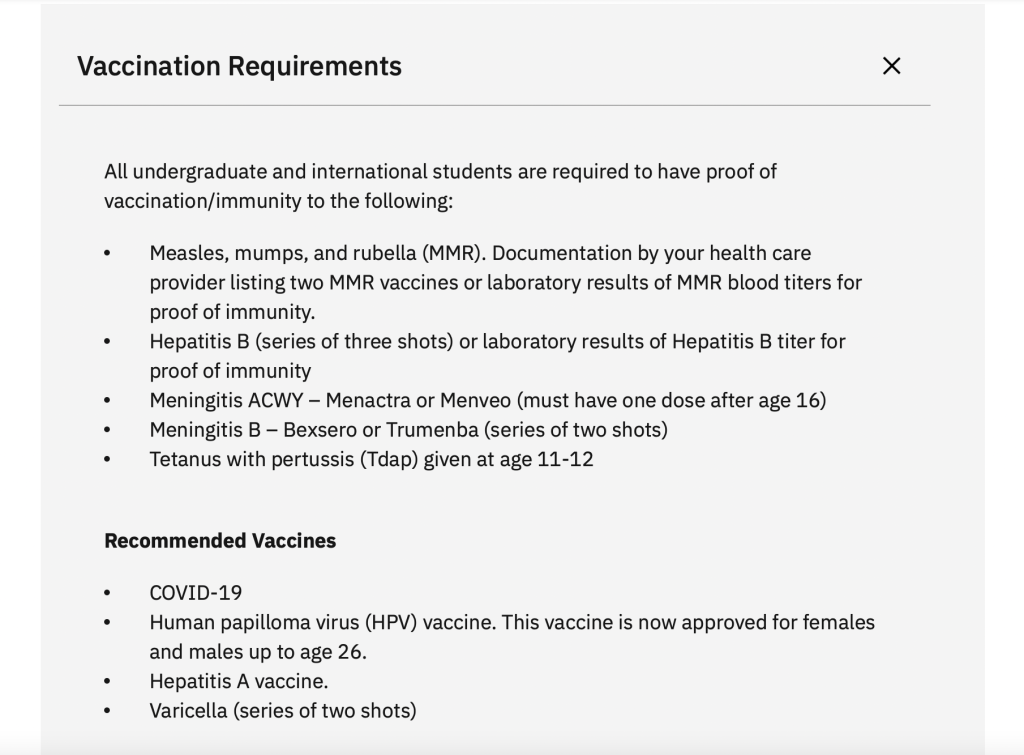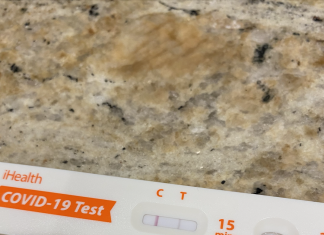The Wellness Center at NEC reports that nearly all students are current on mandatory vaccines after a campaign to distribute educational materials and provide access to clinics at the start of the school year.
According to Jessie Hull, NEC’s Medical Director and nurse practitioner, all NEC students, including on-campus and commuters, must get certain vaccines to attend classes. These include Tdap, hepatitis B series, MMR series, meningitis A and B. While not mandatory, Hull recommend students take their yearly Covid-19 and Influenza vaccine. The Wellness Center also recommends students get the HPV, Hepatitis A, and the Varicella vaccine. Hull adds that some students may be eligible for a vaccine exemption for medical or religious reasons. Requests for religious exemptions are sent to the Dean of Students while medical exemptions are decided by the Wellness Center.
Hull notes that vaccines are important for students to get not only because they are required. “All of these vaccines are protecting you from a potentially really devastating illness or disease,” Hull said. College students are also at an especially high risk of contracting illnesses because of the close quarters students may be in, and the proximity to other students that come from all over the country and world, she said.

Vaccines are available through the school for students who are eighteen years old or students who are seventeen, with parental consent. Students who are nineteen years and older have to go through a more complex process in order to receive vaccines, “Which is why we arrange these vaccine clinics to try and get people more access,” Hull said.
When asked what students should know before getting a vaccine, Hull said that students should “know everything you can about [vaccines].” On October 6, 2025, the CDC updated their stance on Covid-19 vaccines. The CDC now recommends people to talk with a health care provider before getting a vaccine to discuss the benefits and risks. Previously, the CDC made a “blanket recommendation” for individuals getting their Covid-19 booster. Hull emphasizes the importance of considering what vaccines may do for students as well as the possible side effects or risks of getting vaccinated.
Hull said social media and claims that circulate in the news have led to confusion and misconceptions about vaccines.
On September 25, 2025, President Donald Trump said in a White House press briefing that “Hepatitis B is sexually transmitted, there’s no reason to give a baby that’s almost just born hepatitis B [vaccine].” Trump further said that “So I would say wait until the baby is 12 years old.”
Hull said this statement is false as hepatitis B can also be transmitted from blood contact or other bodily fluids. The hepatitis B vaccine is typically given to a baby in the hospital which is the first in the series. The process of birth can possibly expose a baby to hepatitis B which is why the first vaccine is given after birth. Hull said the introduction of the hepatitis B vaccine to babies has led to a major decrease in babies contracting hepatitis B.
One major vaccine misconception that Hull mentioned is the notion that vaccines cause autism. Hull said the connection between getting vaccines and autism is based on unfounded medical information. In the 1990’s, an English doctor, Andrew Jeremy Wakefield, claimed in a paper that there was a connection between getting vaccines, specifically getting the MMR vaccine and autism. This paper has been extensively called fraudulent by other medical professionals. The paper has still led to people fearing vaccines and more misinformation about other aspects of vaccines, causing autism to spread. Wakefield was later revoked of his medical license for acting “dishonest, misleading and irresponsible while carrying out [this] research.”
Hull was also asked whether she had noticed a positive or negative trend regarding NEC students’ response to getting vaccinated. Hull said that she has seen positive reactions to getting vaccinated and that since working at NEC in 2022, she has seen more student’s complaint with their vaccines than when she first arrived. She also attributes this positive trend of vaccine compliance to the constant communication and collaboration among students and faculty from various departments.
Hull said that the Wellness Center will continue educating students on vaccines and will continue to schedule vaccine clinics so that students have easy access. Hull hopes to further improve health education on campus by giving students more information about vaccines, their importance, and specific information that students should know before getting their vaccine.













